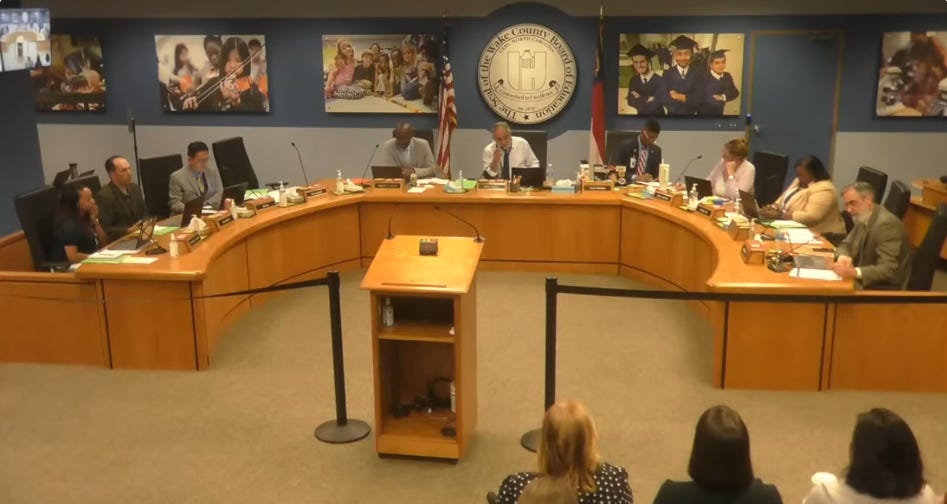Wake County (NC) School Board Finalizes Policy on Parental Inspection and Objection to Instructional Materials
County adopts Policy 3210, formalizing parents’ rights to review and challenge school materials as educators warn of workload strain and advocates debate transparency versus classroom censorship
Raleigh, NC, Oct. 12, 2025 — The Wake County Board of Education has given final approval to Policy 3210 (document), a measure formalizing how parents may inspect, challenge, or restrict access to instructional and library materials in their child’s school. The decision aligns Wake County with a growing number of districts across North Carolina implementing new parental-rights laws amid ongoing national debates over curriculum transparency and book access.
The policy was approved on October 7th without discussion. But its impact was felt throughout the meeting’s public-comment period, where educators, parents, and community members voiced contrasting opinions about whether it represents greater transparency or an unnecessary chill on classroom instruction.
What Policy 3210 Does
The six-page policy codifies how parents can review classroom materials, challenge content, or restrict their child’s access to specific books.
Key provisions include:
Parents must receive access to requested materials within ten business days of a written request.
A three-tier challenge process allows objections to be reviewed first at the school, then by a districtwide Central Instructional Materials Committee, and finally, if appealed, to the Wake County Board of Education.
Parents may limit their own child’s access to particular library or classroom books via the online parent portal or written request.
Once a determination is made, it remains binding for two years, preventing repeated challenges to the same title within that period. The policy explicitly references constitutional limits, noting that books “may be removed only for legitimate educational reasons” and that decisions must comply with First Amendment protections.
Built on North Carolina’s Parental-Rights Laws
Policy 3210 mirrors requirements from North Carolina’s “Parents’ Bill of Rights” (Session Law 2023-106) and subsequent amendments. These statutes compel local school boards to adopt clear processes for parental inspection of instructional materials and to handle formal objections through a structured appeal system.
In essence, Wake County’s rule localizes these statewide mandates by specifying timelines, committee composition, and appeal pathways. The district’s legal references also include other general statutes, which govern curriculum oversight and public access to instructional resources.
Part of a Broader National Movement
Wake County’s revisions come amid similar initiatives across the country.
Florida’s 2022 “Parental Rights in Education” law and Virginia’s 2022 parental-notification policy require school districts to let parents review classroom materials and library catalogs.
Texas and Tennessee have enacted statutes mandating online posting of book lists and parental opt-out rights.
At the federal level, the Protection of Pupil Rights Amendment guarantees parents the right to inspect instructional materials used in federally funded programs.
Courts have also defined constitutional limits: the U.S. Supreme Court’s 1982 decision in Board of Education v. Pico ruled that school officials cannot remove books from libraries merely because they disagree with their ideas.
By citing these precedents, Policy 3210 situates Wake County within a national framework balancing parental oversight and students’ First Amendment rights.
Public Concerns and Support
During the public comment section of the meeting, speakers highlighted the policy’s real-world effects.
A parent from Fuquay-Varina, praised educators and warned that removing books undermines empathy and understanding. Holding up The Autobiography of Malcolm X, she said, *“The answer to books with perceived bad ideas is not fewer books—the answer is more books.”*
Another parent argued the opposite, saying parents must ensure schools do not “teach children to disassociate their identity from their body.” He described the policy as one step toward restoring parental trust.
Several librarians and teachers said the new state mandates—combined with Policy 3210’s local procedures—are causing fear and extra workload.
A librarian at Fuquay-Varina Elementary, said online posting of classroom book lists has led some teachers to “take their entire book collections home.”
A Broughton High School librarian called the timeline “unrealistic,” while another from Davis Drive Elementary warned that “a rushed implementation means empty bookshelves.”
Arguments For and Against Implementation
Supporters Say:
The policy provides accountability and transparency, giving parents a structured voice in their children’s education.
It creates due-process safeguards—clear deadlines, multi-level review, and written decisions.
The framework is consistent with state and federal parental-rights laws and helps pre-empt unregulated disputes.
Critics Warn:
The detailed review process and online catalog mandates may discourage teachers from maintaining rich classroom libraries.
It risks politicizing curriculum decisions and restricting student access to diverse perspectives.
Implementation could drain staff time from instruction and student support to manage documentation and hearings.
Local Context and Next Steps
Wake County joins other large North Carolina districts, such as Mecklenburg and Guilford, that have updated policies in response to the state’s 2023 legislation. Each school must now keep a searchable library catalog on its website and process parental restriction requests throughout the year.
The district’s Library Media Services Division will coordinate appeals and ensure compliance with open-meeting requirements for book-review committees. Policy 3210 replaces an earlier 2017 version and incorporates updates from 2023, reflecting the new legal and cultural environment of 2025.
A Balancing Act
For supporters, Policy 3210 represents a modernization of transparency in a large, diverse district. For critics, it marks a turning point in the politicization of public education.
As one local librarian summarized, the challenge will be ensuring Wake County schools remain “both open to parents and open to ideas.”


